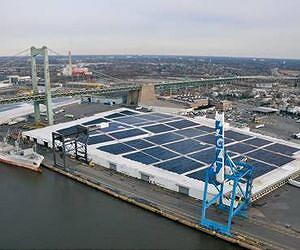Incentives made largest rooftop solar array on continent possible
 The Gloucester City Marine Terminal received more than $11 million in tax rebates earlier this year for its rooftop solar array, the largest in North America.
The Gloucester City Marine Terminal received more than $11 million in tax rebates earlier this year for its rooftop solar array, the largest in North America.
The incentives for solar installation in New Jersey paired with federal incentives made the 27,000-panel project possible, said Keith Peltzman, president of Independence Solar.
Peltzman’s company, a solar consulting firm, helped the Holt family that owns the marine terminal through the whole process.
“They were getting calls from hedge fund managers and things asking if they could install solar on the roof,” Peltzman said. “The Holts sensed that these folks were pretty eager.”
Realizing that the roof was a commodity, the Holts decided to peel back the onion and see if they should be making the investment themselves.
This was 2010 and the Solar Renewable Energy Credit was worth $600 in New Jersey, the Holts could depreciate the investment in a year on their federal taxes and New Jersey had just increased its net-metering benefit.
“All of that absolutely makes it possible,” Peltzman said. “It’s a profitable project.”
It cost about $42 million all together and covers 1.1 million square feet of rooftop at what is probably the largest refrigerated marine terminal in the U.S. Fruit and vegetables are delivered there from all over the world and they have to be kept at varying different consistent cool temperatures even on hot summer days.
It was fully installed in five months, which is rather fast for a project of this magnitude, Peltzman said.
Peltzman said the system would likely save the Holts between $1 and $1.5 million per year on their energy bill.
It produces enough power to cover about 80 percent of the facility’s energy use and Peltzman said it should save enough money in four or five years to pay off the Holts’ loan for the project.
The bank financed the project in a creative way, using the panels as the only asset backing without requiring the Holts to put the marine terminal or any other personal property up as collateral, Peltzman said.



